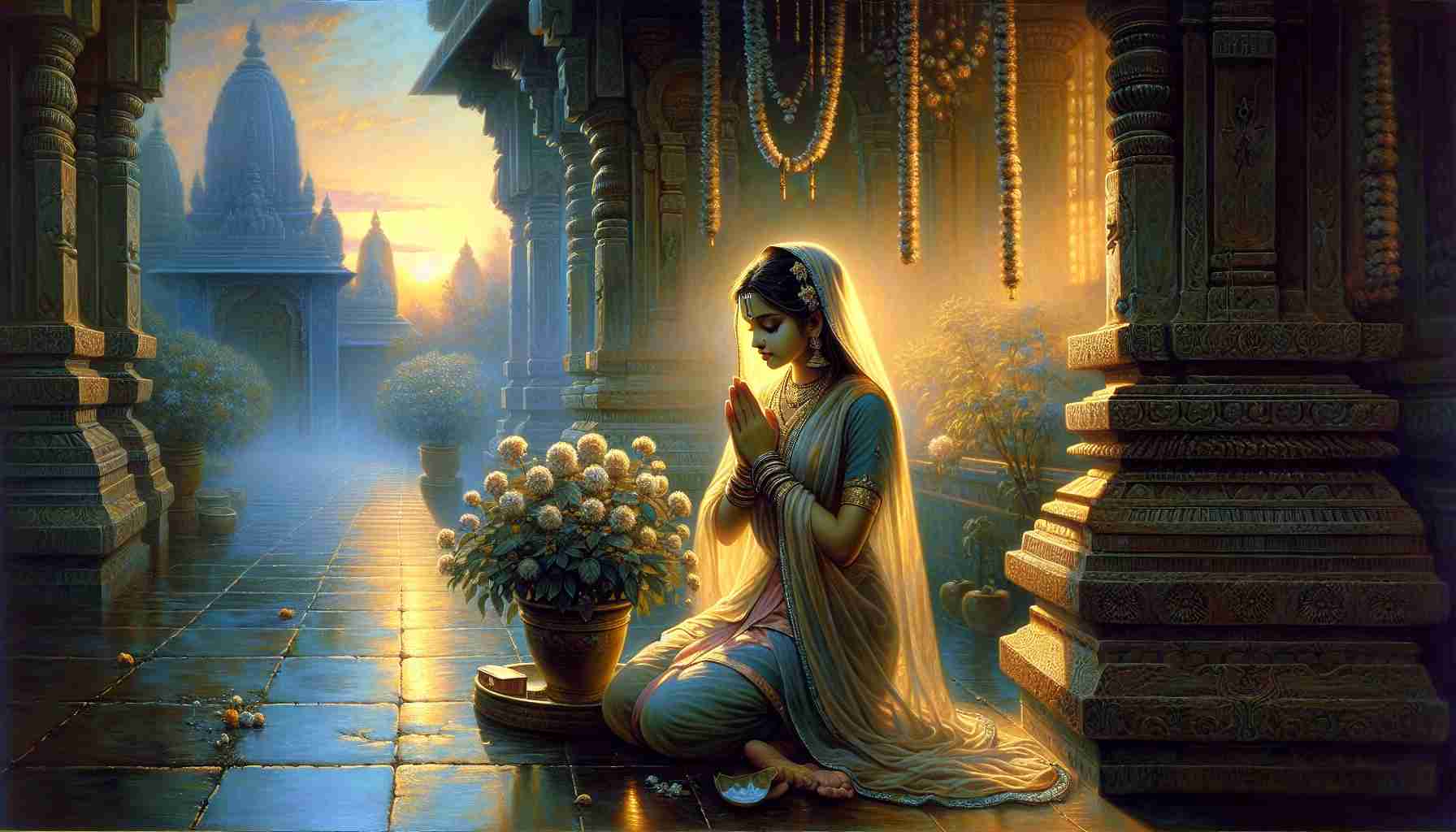

I am Meera, daughter of a temple flower-seller in Vrindavan. My mother used to say I was born with Lord Krishna’s name on my lips. As a child, I believed her. I’d hum bhajans—devotional songs—into garlands of jasmine, twining His name between petals. But that was before life made me feel small.
When I turned thirteen, my father died suddenly, and we couldn’t afford school anymore. The few friends I had drifted away. “You’re just a flower girl,” someone once said, laughing. That night, I pressed my face to my knees and cried until my breaths became gasps. I began to believe what others said: that I was less—unimportant, forgettable, easy to discard.
I stopped singing. I stopped speaking altogether when I could. Even going to the temple—our family’s everyday rhythm—felt wrong. Who was I to stand before Krishna, the dark one who lifted mountains? I had nothing to offer but silence.
One dusk, I lingered behind the temple, near the tulsi plant. It wasn't intentional. I just didn’t want to walk home yet, and the courtyard was empty. Something about the way the light touched the worn steps, the scent of ghee from the evening arti—I don’t know. My hands moved on their own, folding in pranam. Then, for the first time in months, I whispered, “Do you see someone like me?”
A breeze stirred the bells. No vision appeared. No voice boomed from the sky.
But something ancient moved inside me—not from outside, but from within. A memory surfaced. When I was little, my father used to tell me from the Gita: “Even if the most sinful worships Me with devotion, he is to be considered righteous.” (Bhagavad Gita 9.30)
I remembered how he’d hold my small face between his hands and say, “Bhakti, child, does not measure worth. It gives it.” He had said it a hundred times, but I only understood it then.
Standing in that courtyard, with no one watching, I finally sang. Soft at first. A verse I used to offer as a girl: “Govinda, Gopala, Krishna Murari…” My voice cracked, but it didn’t matter. He was always listening.
From that night, I came back daily—not because I was healed, but because I started believing I could be. Slowly, the songs returned. I offered garlands again, even when my hands trembled.
Over time, I noticed something. The ache of unworthiness didn’t vanish, but it no longer ruled me. I wasn’t perfect. I had nothing grand to offer. But I was seen. That was enough.
In the Upanishads, it is said: “He who sees all beings in the Self, and the Self in all beings, never turns away from it.” (Isha Upanishad 6)
I understand now. Bhakti—devotion—isn’t about proving yourself to the Divine. It’s about letting the Divine remind you who you already are.
Even a cracked voice can praise. Even a forgotten girl can be loved.
And so, I sing.
I am Meera, daughter of a temple flower-seller in Vrindavan. My mother used to say I was born with Lord Krishna’s name on my lips. As a child, I believed her. I’d hum bhajans—devotional songs—into garlands of jasmine, twining His name between petals. But that was before life made me feel small.
When I turned thirteen, my father died suddenly, and we couldn’t afford school anymore. The few friends I had drifted away. “You’re just a flower girl,” someone once said, laughing. That night, I pressed my face to my knees and cried until my breaths became gasps. I began to believe what others said: that I was less—unimportant, forgettable, easy to discard.
I stopped singing. I stopped speaking altogether when I could. Even going to the temple—our family’s everyday rhythm—felt wrong. Who was I to stand before Krishna, the dark one who lifted mountains? I had nothing to offer but silence.
One dusk, I lingered behind the temple, near the tulsi plant. It wasn't intentional. I just didn’t want to walk home yet, and the courtyard was empty. Something about the way the light touched the worn steps, the scent of ghee from the evening arti—I don’t know. My hands moved on their own, folding in pranam. Then, for the first time in months, I whispered, “Do you see someone like me?”
A breeze stirred the bells. No vision appeared. No voice boomed from the sky.
But something ancient moved inside me—not from outside, but from within. A memory surfaced. When I was little, my father used to tell me from the Gita: “Even if the most sinful worships Me with devotion, he is to be considered righteous.” (Bhagavad Gita 9.30)
I remembered how he’d hold my small face between his hands and say, “Bhakti, child, does not measure worth. It gives it.” He had said it a hundred times, but I only understood it then.
Standing in that courtyard, with no one watching, I finally sang. Soft at first. A verse I used to offer as a girl: “Govinda, Gopala, Krishna Murari…” My voice cracked, but it didn’t matter. He was always listening.
From that night, I came back daily—not because I was healed, but because I started believing I could be. Slowly, the songs returned. I offered garlands again, even when my hands trembled.
Over time, I noticed something. The ache of unworthiness didn’t vanish, but it no longer ruled me. I wasn’t perfect. I had nothing grand to offer. But I was seen. That was enough.
In the Upanishads, it is said: “He who sees all beings in the Self, and the Self in all beings, never turns away from it.” (Isha Upanishad 6)
I understand now. Bhakti—devotion—isn’t about proving yourself to the Divine. It’s about letting the Divine remind you who you already are.
Even a cracked voice can praise. Even a forgotten girl can be loved.
And so, I sing.